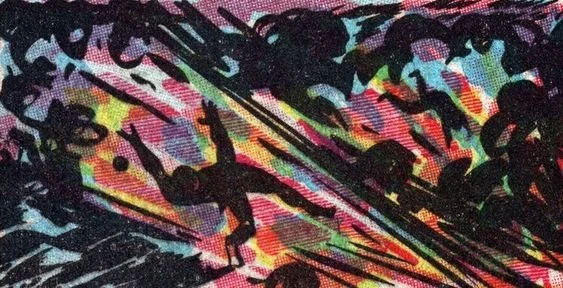Temptation
1.
Why is it so hard to express a genuine love for a piece of media, without lacing it with irony.
This laced irony which webs across any opinion or recommendation I express, wraps me almost in a blanket of protection—one which also detracts and obfuscates much of my love for it in the first place. The balancing act between genuine and ironic seems to bleed into every interaction these days, online or offline (I prefer offline term-wise more than real life because we all know online is the default way of being for human life). But all these interactions, whether it is lit by RGB or in-person LEDs, for myself, fluctuate between wanting to express a deeply emotional part and falling into the trap of self-ironic verse. The temptation to self-sabotage passion in the fear of not being heard, enacting the de-connective social act myself, not allowing the other to do it for me.
Why is it so hard to express a love for something, a song, a book, a poem.
I feel I spend more time on evaluating and justifying its value to myself. This goes back to the relations of trust we build with our beloved media objects in Thumbnails: a greater reason why more and more people read the comment sections either after, during, or before a playing video is telling of the fact that people are obsessed intimately with what they consume. It seems I work backwards from the moving feeling I feel initially. I go to comments, I go to articles, I go to reviews that hopefully embolden and make me feel right about my value judgement of a piece of media. So incapable of making a clear decision myself, I want to establish my own digital entertainment literature review, seeing how the song I love is gauged by the masses. The equally critical and illiterate masses.
That feeling I love which was felt so profoundly initially. I do love a lot of media, and the term media feels constraining in regards to the emotional depth I aim to explicate, that emotional depth that I’ve felt elicited from me. That feeling of a word not giving me the meaning I wish to use it for, which feels similar to saying consuming versus experiencing, saying that you’re consuming a book feels incredibly crass as opposed to reading. A reason why I detest Audiobooks, they feel like a false reproduction, the more entertaining simulacra of the medium it fails to reproduce in satisfaction and transcendence.
I struggle sometimes using the word Media interchangeably with Art. The latter word I view as a peak compliment to any media object. Art has this transcendental connotation, while the term media makes it feel more like a product, or merely, sadly just, a thing. A small minuscule thing. And how can this small thing ever make me feel anything. Weightless, almost too meaningless in its simplicity. What do you think of when hearing the word Media, an example doesn’t come to mind as much as maybe a technology. Or a program of study.
2.
The temptation to lace a love with irony, to lace something deeply moving with a descriptor that is deeply sabotaging. The irony, which is deposited hand in hand with cynism. I find the David Foster Wallace point about Irony and Cynism constituting what made early postmodernists great artists relevant. Irony -> Satire, splits things apart and then positions above them so we can see the flaws and hypocritical implications down below, dissected for us. We gravitate towards irony and cynicism because there is a fear of looking sentimental and naive, of wanting to provide a cheesy solution to a non-cheesy problem. Irony and cynism become a tool, and perhaps if we were to pretend all of McLuhan’s most provoking quotes were actually socially determinist rather than technologically: “We become what we bold. We shape our tools, and thereafter our tools shape us.”, then the social application and critical reception to postmodernist ironic works—now, thereafter, shape us.
I’m not writing thinking I’m providing something new (I am not capable of it—a disclaimer which is in itself, a blanket of cynism I drape over my chest). But I think to tackle any further research into my understanding of the ideological role of Entertainment, I have to go deeper into postmodernism, Frederic Jameson and others. I have to go into the role irony and cynism play in the pig-slop industrial complex. How itself is reified in everyday life, everyday consumable culture.
3.
What is the equal amount? What is the right amount for this dosage. To care so deeply about things, but to then not be capable of expressing it in fear of a lack of understatement, or worse, the pariah-ship that could be prescribed to said expression. I seem fated to be an insecure, shy, self-loathing snob. I think what depresses me is those who do not feel this snobbish want to share the things that move so deeply. Those who seem too have not have been moved so much by passages and verses. Consuming media purely as self-medication, or for the passage of time. But to those who actively seek at least a sense of agency in their taste, curation exists; now the problem is whether or not they direct it in a non-slop direction.
But I also sometimes find out I’ve been directing my love in a pig-slop direction. My own compass, delicately wavering and shaking until the passage of time allows the cream to rise to the top. North is finally visible. But I think the continual experiencing of new things, forces that compass itself to update. Now, if only I would have the guts to share what my compass is saying without using Irony to shoot myself in the mouth. To shoot myself in the heart.

